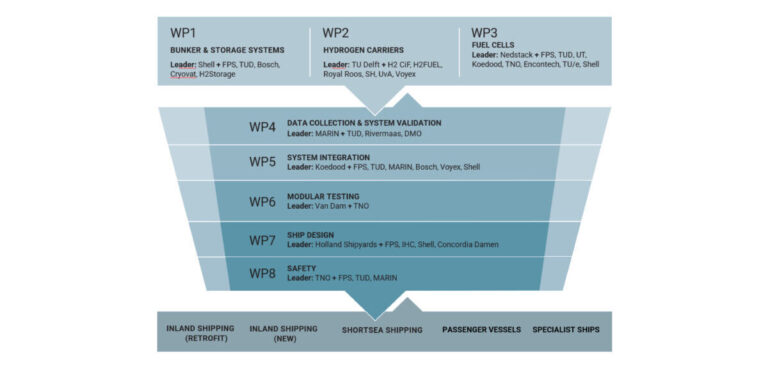A Dutch project consortium called SH2IPDRIVE (Sustainable Hydrogen Integrated Propulsion Drives) has been awarded a €24.2m (US$27.4m) subsidy from the R&D Mobility Fund in the Netherlands.
Consisting of 25 companies and knowledge institutions from within the maritime sector, the consortium aims to accelerate the uptake of hydrogen as a marine fuel by working collaboratively on innovation projects.
With a total project fund of €34m (US$39m), the consortium will be able to carry out extensive research and development into an array of hydrogen applications.
“SH2IPDRIVE will ensure the Dutch maritime sector is in a prime position to respond to the expected market demand for hydrogen systems,” commented Klaas Visser, ship design, production and operations, TU Delft. “By providing the necessary innovation stimuli to technology developers, suppliers, shipowners and shipbuilders, [it] will strengthen the country’s competitive position as a leader in the field of maritime hydrogen applications.”
SH2IPDRIVE aims to lay the foundation for a strong maritime hydrogen economy in the Netherlands. The consortium’s aims also align with objectives outlined in the Dutch Maritime Master Plan which seeks to strengthen the Netherlands’ position as a world leader in terms of sustainable shipbuilding and shipping.
The project will cover the full scope of hydrogen research and development and has been separated into nine different work packages including: bunker and storage systems, hydrogen carriers, fuel cells, data collection and system validation, system integration, modular testing, ship design and safety.
“This is the project we need to boost knowledge and technology in the field of hydrogen applications in the maritime sector and to create a strong Dutch ecosystem,” explained Marjon Castelijns, manager business development, Future Proof Shipping (FPS). “We already know that hydrogen can be produced completely carbon-free through green electricity.
“With the electrochemical conversion of hydrogen in a fuel cell, power can be generated onboard to drive ships fully emissions-free with no greenhouse gases, nitrogen oxides, or particulate matter being released. However, to achieve a fully zero-emissions shipping sector quickly and cost-effectively, a lot more research is required in optimal techniques, applications and standardizations. This is exactly what all parties of SH2IPDRIVE are working on.”
The main aim of the SH2IPDRIVE consortium is to develop reliable, safe, standardized, scalable and cost-effective solutions to enable the use of zero-emission propulsion and energy systems onboard hydrogen-based ships.
The project will also conduct research into the development of safe technologies that utilize compressed hydrogen gas, liquid hydrogen, and hydrogen bound to carriers such as liquid organic hydrogen carriers and borohydrides. Fuel cell systems with a greater power density and a longer lifespan will also be explored.
Furthermore, the 25-strong team will develop technical standards for the bunkering and storage of hydrogen for shipping, the integration of hydrogen technology onboard ships and overall ship design.
The development of technological components and subsystems will be validated in five concept designs to represent a range of ship types that are viewed as important for the Dutch shipping industry. These include inland shipping new construction, inland shipping retrofit, coastal/shortsea shipping, passenger vessels and specialist ships.



